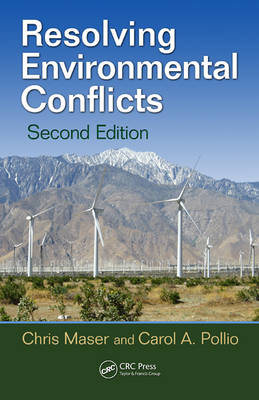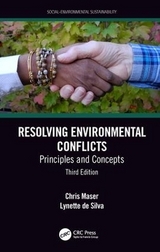
Resolving Environmental Conflicts
Crc Press Inc (Verlag)
978-1-4398-5608-6 (ISBN)
- Titel erscheint in neuer Auflage
- Artikel merken
Once the consultants and mediators leave, the work must go on. This second edition covers the basic transformative concepts vital for resolving environmental conflicts. It includes discussions of the inviolate biophysical principles, how the English language is changing, as well as the critical principles of social behavior. It also examines new dynamics in making decisions along with the effects of the younger generations shifting their interests from nature-oriented interest to technologically oriented interests and their subsequent lack of understanding the importance of the natural environment to a sustainable society.
No biological shortcuts, technological quick fixes, or political rhetoric can mend what is broken. Dramatic, fundamental change is necessary if we are really concerned with bettering the quality of life. It is not a question of can we change or can't we, but one of will we change or won't we. Change is a choice, a choice of individuals reflected in the collective of society and mirrored in the landscape throughout the generations. Considerably more than a "how to" directive, this book examines the "whys" of the mediation process and broadens the knowledge base by providing the philosophical underpinnings of "a new environmental responsibility."
Chris Maser is an Author and Consultant in Corvallis, Oregon. Carol A. Pollio is a Consultant and Professor at American Public University, Amherst, Massachusetts.
Introduction
Approaches to Mediation
Mediation at the Crossroads
A Brief Look at the Mediation Process We Practice It
Conflict is a Choice
What Is A "Right"?
The Equality of Differences
Environmental Justice Is Predicated On Human Equality
Perceived Resource Scarcity Accentuates Environmental Conflict
Resource Overexploitation: A Matter of Perceived Loss
Conflict is a Mistake
Conflict is Usually Based on the Misjudgment of Appearances
Biophysical Principles of Sustainability
The Waterbed Principle
Understanding the Law of Cosmic Unification
The Inviolate Biophysical Principles
Social Principles of Sustainability
The Paradox of Life
Air: The Breath of Life-And Of Death
Soil: The Great Placenta
Water: A Captive of Gravity
Biodiversity: The Variety of Life
Sunlight: The Source of Global Energy
Human Population: A Matter of Gender Equality
How the Commons Usufruct Law Arose
The Precursor of Today's Environmental Conflicts
Social Principles of Engagement in a Sustainable Society
The Human Equation
A Child's Gift
We Take Our Family With Us
Dysfunctional Family Dynamics Lead To Ongoing Destructive
Conflict
Homeostasis Is Designed To Hide Dysfunction
Boundaries, The Silent Language
Coping Mechanisms: Unconscious Thoughts That Manifest As Regonizable Behaviors
The Capacity For Rational Thought
Everyone Is Right From Their Point of View
Acceptance of Circumstances Offers the Choices of What Might Be
Communication: The Interpersonal Element
Language as a Tool
The Use of Silence In Communication
The Need to Be Heard
The Basic Elements of Communication
Changes in the Children's Oxford Dictionary
Nature Deficit Disorder in Children
Barriers to Communication
Inability to Transfer Experiences from One Situation to Another
The Process Is The Decision
Faith in the Process is Belief in the Outcome
The Primacy of Process
Perception is Truth; Facts Are Relative
Reframing the Issue
Conflict Is a Learning Partnership
A Mediator Is At All Times a Guest And A Leader Simultaneously
The Fallacy of Rescuing
A Mediator's Role in Participant Relationships
Mediation Means Total Participation
Detachment and Equanimity
As A Mediator, You Must Be A Sieve, Not A Sponge
As A Mediator, You Are The Keeper Of Each Participant's Dignity
Have A Beginner's Mind
Being Oneself
The Continual Learning Curve
Practicing the Mediation of Conscience
Compromise and the Point of Balance
A Curriculum of Compassion and Justice
Mediation as a Gift is Free, But as a Trade Has a Cost
Resolution: Social-Environmental Conflict Brought To A Shared Vision
Who Are We As A Culture?
What Legacy Do We Want To Leave Our Children?
Vision, Goals, and Objectives
Modifying Our Belief Systems Regarding Change
| Reihe/Serie | Social Environmental Sustainability |
|---|---|
| Verlagsort | Bosa Roca |
| Sprache | englisch |
| Maße | 152 x 229 mm |
| Gewicht | 657 g |
| Themenwelt | Naturwissenschaften ► Biologie ► Ökologie / Naturschutz |
| Recht / Steuern ► EU / Internationales Recht | |
| Recht / Steuern ► Öffentliches Recht ► Umweltrecht | |
| ISBN-10 | 1-4398-5608-7 / 1439856087 |
| ISBN-13 | 978-1-4398-5608-6 / 9781439856086 |
| Zustand | Neuware |
| Haben Sie eine Frage zum Produkt? |
aus dem Bereich



